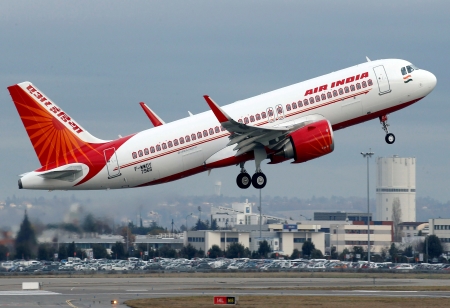
Singapore Airlines Acquires Stake Worth USD 267M in Air India Post Air India-Vistara Merger

 The agreement between Singapore Airlines and Tata Sons (Tata) will inject an additional SGD 360 million (USD 267 million) into Air India. Following Tata's takeover and merger with Vistara Airlines, it will give SIA a 25.1% stake in the enlarged Air India group.
The agreement between Singapore Airlines and Tata Sons (Tata) will inject an additional SGD 360 million (USD 267 million) into Air India. Following Tata's takeover and merger with Vistara Airlines, it will give SIA a 25.1% stake in the enlarged Air India group.
One of the key strategic initiatives for future growth mentioned in the quarterly financial report is the November 2022 agreement between Singapore Airlines and Tata Sons to inject another USD 267 million into Air India. Regulatory approval is still required for this agreement.
SIA in the statement said, "The merged entity will be four to five times larger in scale compared to Vistara, with a strong presence in all key airline segments in India. The proposed merger will bolster SIA's presence in India, strengthen its multi-hub strategy, and allow it to continue participating directly in this large and fast-growing aviation market."
The airline further said, "Deeper collaboration with like-minded airlines is an integral part of the SIA Group's partnerships strategy. This enables SIA and its partners to drive more traffic to their hubs, offer more options to customers, and increase the Group's global footprint."
Singapore Airlines (SIA) announced last week that its net profit for the third quarter, which ended in December, was SGD 628 million (USD 465 million), and its fiscal year-to-date profits reached SGD 1,555 million (USD 1,152 million). They are the airline's highest earnings in a quarter as well as the first nine months of a fiscal year.
This is due to "the robust demand for air travel continuing into the third quarter of FY2022/23, building on the momentum that began after Singapore relaxed its border restrictions in April 2022," the airlines said in a statement. The SIA fiscal year begins in April.
This follows Singapore's announcement on February 13 that it will relax all remaining Covid restrictions for both visitors and locals. Travellers who have not been fully immunised against Covid will no longer be required to show proof of a negative pre-departure test before entering Singapore, nor will they be required to purchase travel insurance to cover Covid treatment if they become ill on the island. Those who have been immunised are no longer required to show proof of vaccination upon arrival. As of the same date, the use of a face mask on public transportation, which was the last remaining local Covid-era protocol, is no longer required.
Singapore was one of the first Asian countries to reopen following the Covid pandemic, which benefited its tourism industry as well as its national carrier. Apart from government grants to affected industries during Covid, the airline benefited from the confidence of its shareholders and financial institutions in its business, raising SGD 22.4 billion (USD 16.6 billion) during Covid, including SGD 15 billion from shareholders (the largest of which is state investment firm Temasek Holdings) through share and convertible bond sales. It still has a cash balance of SGD 15.4 billion as of December 2022.
This allowed it to retain the majority of its workforce and fleet, as well as expedite route restoration once travel resumed. This was in contrast to other regional airlines, which had to lay off employees and sell aircraft to stay afloat. SIA reported that its group passenger capacity reached 80% of pre-Covid levels in December 2022, exceeding the Asia-Pacific region average of 51%.
In the third quarter, its two main airline brands carried 7.4 million passengers, up 17% from the previous quarter. When the first two quarters are combined, the SIA Group served 18.8 million passengers in the first nine months of the fiscal year. This is a nine-fold increase from a year ago (2021), when the majority of the world's borders were closed
Passenger load factors for the Group increased by 0.8 percentage points to 87.4%, the highest for any quarter, thanks to record load factors for both premium airline SIA (87.3%) and low-cost carrier Scoot (87.8 per cent).
SIA reported that cargo performance moderated compared to the previous quarter due to softening demand and an increase in belly hold capacity as more passenger aircraft returned to service around the world. While yields fell quarter on quarter, they remained high – nearly double – compared to pre-Covid levels.
Overall, SIA's revenue for the three months to December increased by SGD 358 million (USD 265 million), or 8% quarter on quarter, to SGD 4,846 million (USD 3,589 million), a record.